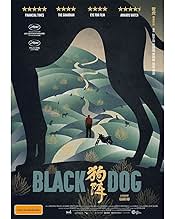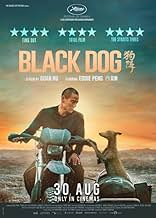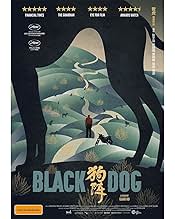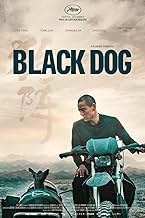Lang kehrt in seine Heimatstadt im Nordwesten Chinas zurück. Als Teil einer Hundestreife, die vor den Olympischen Spielen 2008 streunende Hunde befreien soll, freundet er sich mit einem schw... Alles lesenLang kehrt in seine Heimatstadt im Nordwesten Chinas zurück. Als Teil einer Hundestreife, die vor den Olympischen Spielen 2008 streunende Hunde befreien soll, freundet er sich mit einem schwarzen Streuner an.Lang kehrt in seine Heimatstadt im Nordwesten Chinas zurück. Als Teil einer Hundestreife, die vor den Olympischen Spielen 2008 streunende Hunde befreien soll, freundet er sich mit einem schwarzen Streuner an.
- Auszeichnungen
- 16 Gewinne & 21 Nominierungen insgesamt
Empfohlene Bewertungen
"Lang" (Eddie Peng) has returned to his hometown after a term in prison. We learn a little more about the causes of that and of his distant relationship with his zoo-keeping father as the story develops, as well as discovering that he once was one of the place's more famous citizens being in a popular local band. With the Beijing Olympiad (2008) looming large, there is quite an emphasis for the government on tarting the place up - and that signals quite significant "improvements" for their home on the edge of the Gobi desert. Much of it has already been earmarked for demolition, and with most of the heart (and soul) of the place already removed, the authorities turn their attention to the serious problem of hundreds of feral dogs marauding around potentially spreading rabies. There is one particularly skinny black one that is worth 1000 Yuan if it can be caught, and that's the target for the motor-cycling "Lang". Thing is, this mutt is no mug, and is soon doing more of the chasing (and biting). One particularly embarrassing nibble sees both confined to his home in quarantine and that's when the bonds begin to become established and we also realise the extent of hostility felt by some to this man. With the bulldozers never far away, his ailing dad's zoo no longer able to care for it's tenants and the vengeful butcher "Hu" (Hu Xiaoguang) and his thugs out for revenge, we settle into a tale of this newfound friendship that's quite engaging. It's predictable in stages, but it's really the largely dialogue-free effort from Peng set against a backdrop of relentless winds, dust and trains rolling through the increasingly lifeless town that gives this a bit of potency. It's not so much that the town is being cleared because of the Olympics, though that's clearly on director Hu Guan's mind, it's that why was a town ever here in this inhospitable place in the place? It's bleak and forlorn, a concrete oasis in the middle of nowhere and that setting works well as the man himself comes across as lonely, detached as well as emotionally and physically rootless. It's a slow watch, but not one that drags, for two hours and it rather effectively sums up an existence of mundanity, lack of opportunity and a desire for a true sense of freedom quite well. Be warned, not a great deal happens - but I did enjoy it.
A minibus is heading for a small, desolate town on the edge of the Gobi desert. A pack of stray dogs charges towards it, scaring the driver and tipping over the bus. Out of it comes Lang, an ex-convict who used to be a popular stunt motorcyclist, now returning to his hometown after 10 years in prison for the murder of a local gangster's nephew. A few conversations with the police later, the title card appears, and the magic of Black Dog begins. A poetic and minimalist film of healing and moving on, portrayed through a friendship, a bond, a spiritual connection between man and dog. The man is Lang, and the dog is the infamous thin black dog that has been terrorizing the town. Rumored of carrying rabies, the black dog goes around defending his territory by pissing on walls and biting people, so everyone is out to catch him.
Black Dog is a story of two lonely strays caged by a world that does not understand them. Two lost souls alienated by the society around them. Two black sheep who do not fit in. Lang is marginalized because of his past as a "murderer", and the black dog is also alienated amongst the other strays for being the biggest, strongest, fastest and most aggressive of all the dogs. One of Guan Hu's main messages in Black Dog is that no animal is evil. Humans can be, but dogs cannot. Stray dogs are violent because they're in constant fear, trying to survive in an evolving environment where they do not belong. Lang is similar to a stray dog. He's not like the others. He only says a few words in the whole film as he's very quiet and introverted. Like the black dog, he's trying to make a life for himself in a town that's in the process of modernization. After his time in prison, Lang has changed, and so did the town and the people he once knew. So now, he doesn't speak, he only exists and goes with the flow. That's why Lang and the black dog are so perfect for each other and why they instantly connected-they're both just trying to survive in a world they no longer know, a world that no longer wants them.
Black Dog is set during an important time for China, a time of urbanization and change. And this little town is impacted deeply. Most of its residents have fled, leaving their dogs behind, who now roam free in the streets and in the desert hills. The zoo is running out of money to sustain the animals, so they too are freed in the desert. The circus is trying to survive, but business hasn't been good. The old is being demolished to make way for the new, which is a clever pararell with the ending of the film, where the black dog dies but leaves behind a new generation of black puppies. The cinematography of Black Dog is gorgeous, with Guan Hu adopting the new "slow-cinema" Chinese style of Bi Gan, which made me fall in love with the film almost instantly. Long, panoramic shots of beautiful landscapes, quiet scenes of motorcycle rides and slow walks through dusty roads and desolate rural villages, are all complemented with a lonesome atmosphere.
Scenes like Lang and the black dog calmly passing through the desert's stray dogs, and the solar eclipse sequence with the zoo's tiger wandering the town's streets freely, are two of my favorite of the entire year so far. And the final shot of Black Dog is so beautiful and meaningful. Through his canine companion, Lang finally learns how to keep on living despite his dark past, and how to find happiness within life's miseries. The Pink Floyd soundtrack gives a certain nostalgia to Guan Hu's relaxing images, and the acting performances are absolutely stellar, human and animal alike, from Eddie Peng to the black dog named Xiao Xin, and the majestic tiger. Just the fact that Eddie Peng developed such a strong bond with Xiao Xin while filming that he felt he had to adopt him afterwards, is a beautiful real-life illustration of the message of this wonderful film. A melancholic and meditative journey of finding your place in the world through friendship, and a genuine tribute to man's best friend, Black Dog is simply one of the best films of the year, and proof that Chinese arthouse cinema is still very much alive.
Black Dog is a story of two lonely strays caged by a world that does not understand them. Two lost souls alienated by the society around them. Two black sheep who do not fit in. Lang is marginalized because of his past as a "murderer", and the black dog is also alienated amongst the other strays for being the biggest, strongest, fastest and most aggressive of all the dogs. One of Guan Hu's main messages in Black Dog is that no animal is evil. Humans can be, but dogs cannot. Stray dogs are violent because they're in constant fear, trying to survive in an evolving environment where they do not belong. Lang is similar to a stray dog. He's not like the others. He only says a few words in the whole film as he's very quiet and introverted. Like the black dog, he's trying to make a life for himself in a town that's in the process of modernization. After his time in prison, Lang has changed, and so did the town and the people he once knew. So now, he doesn't speak, he only exists and goes with the flow. That's why Lang and the black dog are so perfect for each other and why they instantly connected-they're both just trying to survive in a world they no longer know, a world that no longer wants them.
Black Dog is set during an important time for China, a time of urbanization and change. And this little town is impacted deeply. Most of its residents have fled, leaving their dogs behind, who now roam free in the streets and in the desert hills. The zoo is running out of money to sustain the animals, so they too are freed in the desert. The circus is trying to survive, but business hasn't been good. The old is being demolished to make way for the new, which is a clever pararell with the ending of the film, where the black dog dies but leaves behind a new generation of black puppies. The cinematography of Black Dog is gorgeous, with Guan Hu adopting the new "slow-cinema" Chinese style of Bi Gan, which made me fall in love with the film almost instantly. Long, panoramic shots of beautiful landscapes, quiet scenes of motorcycle rides and slow walks through dusty roads and desolate rural villages, are all complemented with a lonesome atmosphere.
Scenes like Lang and the black dog calmly passing through the desert's stray dogs, and the solar eclipse sequence with the zoo's tiger wandering the town's streets freely, are two of my favorite of the entire year so far. And the final shot of Black Dog is so beautiful and meaningful. Through his canine companion, Lang finally learns how to keep on living despite his dark past, and how to find happiness within life's miseries. The Pink Floyd soundtrack gives a certain nostalgia to Guan Hu's relaxing images, and the acting performances are absolutely stellar, human and animal alike, from Eddie Peng to the black dog named Xiao Xin, and the majestic tiger. Just the fact that Eddie Peng developed such a strong bond with Xiao Xin while filming that he felt he had to adopt him afterwards, is a beautiful real-life illustration of the message of this wonderful film. A melancholic and meditative journey of finding your place in the world through friendship, and a genuine tribute to man's best friend, Black Dog is simply one of the best films of the year, and proof that Chinese arthouse cinema is still very much alive.
I had no idea idea what to expect when I saw this movie. It was slow moving but fully engrossing. It is set amongst a somewhat grim environment but really opened my eyes to how people exist in some parts of China. It is an austere existence, barren and treeless yet the town is gearing up for the 2008 Beijing Olympics with propaganda blasted over the loudspeakers in true communist China fashion.
Although it is a sobering film, there are several parts that are quite humorous and while it isn't heavy on dialogue, it is what NOT is said that makes you think.
I can see what this was a winner at CANNES.
Although it is a sobering film, there are several parts that are quite humorous and while it isn't heavy on dialogue, it is what NOT is said that makes you think.
I can see what this was a winner at CANNES.
The Gobi desert is impressive in its desolation, but what's even more so is the desolation of this run-down small town just before the Beijing Olympic Games from 2008. I don't think I have ever seen something quite like it, on screen or in reality. This is dystopia on earth, in the not so distant past. I guess it's the only thing quietly criticizing the regime or showing the failure of Chinese society, good thing the movie is focused on something else entirely and probably that's how it got past censorship, but I am still impressed.
No animals were harmed during the making of this movie. Kidding. No, but seriously, I do not understand how they made this movie. Packs of stray dogs, it's the humans that are guilty. How many dogs this town has managed to abandon is again impressive.
Should have ended with the animals roaming free on the town streets, that felt like the climax of the movie and had a bit of a surreal feel.
Is dog man the equivalent of cat lady?
It didn't quite work for me, despite what my eyes were able to take in. I couldn't connect to the character or even root for him in particular. The plot felt aimless. Those bozos chasing him for revenge kept popping up and doing the most heinous things and then they would let it go. And then again. It made no sense. And honestly after the snakes they were irredeemable. In fact quite a lot of questionable characters here. Our lead is not particularly sympathetic either.
But OMG Jia Zhangke acts in this movie! I was actually comparing the look to Unknown Pleasures. I guess he wanted to support the movie.
No animals were harmed during the making of this movie. Kidding. No, but seriously, I do not understand how they made this movie. Packs of stray dogs, it's the humans that are guilty. How many dogs this town has managed to abandon is again impressive.
Should have ended with the animals roaming free on the town streets, that felt like the climax of the movie and had a bit of a surreal feel.
Is dog man the equivalent of cat lady?
It didn't quite work for me, despite what my eyes were able to take in. I couldn't connect to the character or even root for him in particular. The plot felt aimless. Those bozos chasing him for revenge kept popping up and doing the most heinous things and then they would let it go. And then again. It made no sense. And honestly after the snakes they were irredeemable. In fact quite a lot of questionable characters here. Our lead is not particularly sympathetic either.
But OMG Jia Zhangke acts in this movie! I was actually comparing the look to Unknown Pleasures. I guess he wanted to support the movie.
A beautiful, slow-burn, and memorizing tale of the grim environment of the rural parts of China with strong performances, direction, writing, and structure. Filmmaker Guan Hu achieves with exploring the relationship between man and dog from a Chinese perspective and filled with gorgeous camerawork, sound designs, and interesting narrative choices, it brings out the realism, engagement, and examination of the characters in a nature way.
With little dialogue, the sobering approach, art-house pacing, and style really brings the narrative into a whole new light. The performances from Eddie Peng and the rest of the cast are great and many of the characters, while some characters could have been explored a little better. I appreciate the movie on exploring about dogs, humanism and society without a biased approach and crafting something that is unique.
Having won the Un Certain Regard prize, I can see why.
With little dialogue, the sobering approach, art-house pacing, and style really brings the narrative into a whole new light. The performances from Eddie Peng and the rest of the cast are great and many of the characters, while some characters could have been explored a little better. I appreciate the movie on exploring about dogs, humanism and society without a biased approach and crafting something that is unique.
Having won the Un Certain Regard prize, I can see why.
Wusstest du schon
- WissenswertesEddie Peng [the lead] established such a strong bond with Xin, the dog featured in the film, that he adopted him after filming had wrapped.
- VerbindungenReferenced in Close-Up: The Best Films and Other Results of 2024 (2024)
- SoundtracksMother
Written by Roger Waters
Performed by Pink Floyd
Top-Auswahl
Melde dich zum Bewerten an und greife auf die Watchlist für personalisierte Empfehlungen zu.
Details
- Erscheinungsdatum
- Herkunftsland
- Offizieller Standort
- Sprache
- Auch bekannt als
- Black Dog
- Drehorte
- Produktionsfirmen
- Weitere beteiligte Unternehmen bei IMDbPro anzeigen
Box Office
- Weltweiter Bruttoertrag
- 2.235.414 $
- Laufzeit1 Stunde 56 Minuten
- Farbe
- Sound-Mix
- Seitenverhältnis
- 2.47 :1
Zu dieser Seite beitragen
Bearbeitung vorschlagen oder fehlenden Inhalt hinzufügen



























